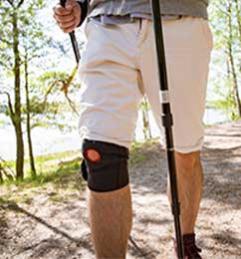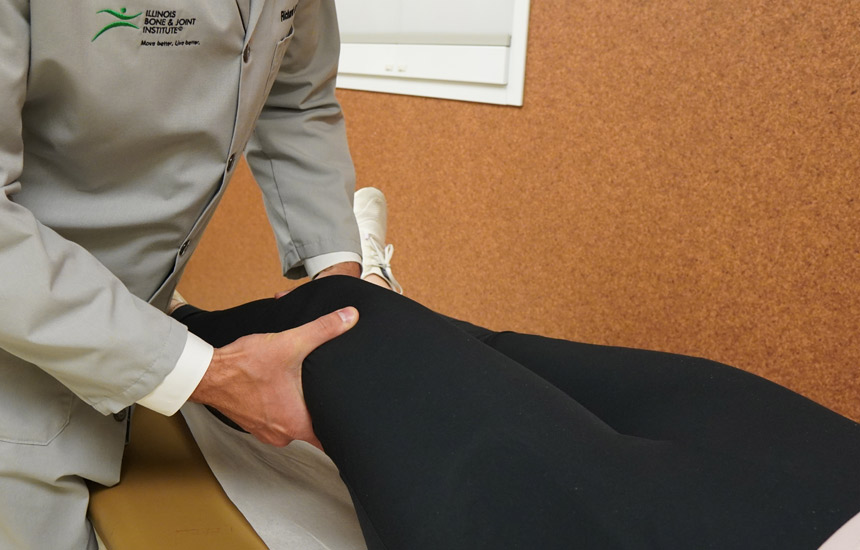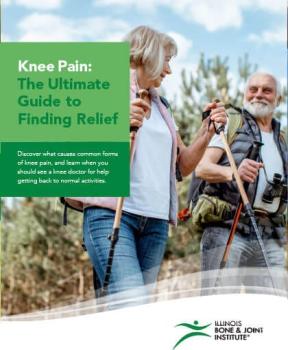Find a Doctor
Show Me Knee Doctors Near Me
If this is a medical emergency, dial 911 immediately or visit one of IBJI’s OrthoAccess Immediate Care locations.

Should I See an Orthopedic Specialist for Knee Care?
IBJI’s knee doctors are experienced in treating the different types of injuries that athletes and non-athletes can suffer.
We will work with you to pinpoint what’s causing your knee pain and create a customized treatment plan based on your goals.
Talk to an expert at the medical office or clinic where you’d like to be seen.
Conditions, Disorders, and Injuries
The knee care experts at IBJI have an in-depth understanding of the various causes of knee pain. They will listen to your concerns, provide a thorough, comprehensive exam to diagnose your condition, and create an ideal care plan to help you get around better without debilitating knee pain.
Causes of Knee Pain
- ACL Tears
- Animal Bites
- Arthritis: Osteoarthritis
- Arthritis: Rheumatoid
- Arthritis: Septic
- Baker’s Cyst
- Burns
- Bone Tumors
- Broken Knee
- Bruised Knee
- Bursitis
- Cancer (Osteosarcoma)
- Chronic Knee Pain
- Deep Vein Thrombosis
- Diabetes-Related Issues
- Dislocated Kneecaps
- Failed Knee Replacement
- Gout
- Iliotibial Band Syndrome
- Infections
- Jumper’s Knees
- Knee Bone Tumors
- Knee Buckling
- Knee Cyst
- Knee Deformity
- Knee Inflammation
- Knee Injury
- Knee Instability
- Knee Laceration
- Knee Locking
- Knee Swelling
- Kneecap Fractures
- Ligament Injuries
- Lupus
- Medial Tibial Stress Syndrome
- Meniscal Tear
- Nerve Conditions
- Osgood-Schlatter Disease
- Osteochondritis Dissecans
- Past Knee Injuries
- Patellar Tendon Tear
- Patellofemoral Pain Syndrome
- PCL Injuries
- Quadriceps Tendon Tear
- Runner’s Knees
- Shin Splints
- Sprained Knee
- Strained Knee
- Tendon Ruptures
- Tendonitis
- Tibial Fractures
- Tibial Plateau Fractures
- Torn Cartilage
- Torn Meniscus
- Traumatic Injuries
- Twisted Knee
- Weak Knee
Knee Treatments
IBJI’s experienced knee care team specializes in today's most advanced surgical and non-surgical treatment options for knee health. They will consider your unique needs and lifestyle as they create a customized care plan to relieve your knee pain and help you get around easier.
Non-Surgical
- Acupuncture
- Analgesics
- Bracing
- Heat/Ice
- Imaging (MRIs and CT scans)
- Immediate Care
- Injections
- Joint Fluid Aspiration (Arthrocentesis)
- Massage Therapy
- NSAIDs and Steroids
- Nutrition Counseling
- Occupational Therapy
- Orthotics
- Pain Management
- Pilates
- Physical Therapy
- Splints
- Sports Therapy
- Weight Loss Assistance
Surgical
- ACL Reconstruction
- Arthrotomy
- Joint Fusion
- Knee Arthroscopy
- Knee Fusion
- Knee Reconstruction
- Knee Replacement: Outpatient
- Knee Replacement: Partial
- Knee Replacement: Revision
- Knee Replacement: Total
- Knee Resurfacing
- Lateral Release
- Microfracture
- Meniscectomy
- Meniscus Repair
- Meniscus Transplant
- Microfracture
- Osteochondritis Dissecans Surgery
- Patellar Tendon Repair
- PCL Reconstruction (Posterior Cruciate Ligament Reconstruction)
- Plica Removal
- Reconstructive Surgery
- Tendon Repair
- Tendon Reconstruction
- Tendon Transfer
- Knee Deformity Surgery
- Subchondroplasty
- Surgical Drainage (Debridement)
Back to the Soccer Field after ACL Injury

"They worked with me tirelessly, were patient, and pushed me to achieve my goal of getting back to playing soccer!"
FAQs About Knee Care
Does Knee Pain Always Result in Knee Replacement Surgery?
No, knee replacement surgery is not always necessary to treat knee pain. Knee care plans are based on a thorough diagnosis of the condition or injury and customized for each individual.
Non-surgical treatments like physical therapy, medications, and other pain management options are often recommended to treat knee pain. Other surgical procedures can include knee arthroscopy, knee resurfacing, osteotomy, and cartilage grafting.
What Is Knee Resurfacing?
A knee orthopedic surgeon can resurface areas of the knee using a minimally-invasive procedure called knee resurfacing. This procedure can be done as an alternative to knee replacement if only one or two areas of the joint are damaged.
Knee resurfacing is most often recommended for the knee care of younger patients with a more physically active lifestyle. Because the procedure is minimally invasive, it typically involves less postoperative pain, faster recovery, and a shorter hospital stay.
What Is Knee Arthroscopy?
Knee arthroscopy is a minimally-invasive surgery in which a few small incisions are made to allow an orthopedic surgeon to place a tiny camera in the knee. The view from the camera helps them visualize and repair the damage to the knee.
Using only small incisions and tiny tools means knee arthroscopy causes more minor damage than traditional surgery. In fact, arthroscopic knee surgery can even be performed using local anesthetic. Recovery from knee arthroscopy is typically easier and quicker than traditional surgery.
What Type of Surgery Is Total Knee Replacement?
Total knee replacement is a very common surgical procedure for knee care. A knee surgeon removes cartilage and the ends of the femur and tibia with specialized instruments to prepare the surfaces of a patient’s bones for implants. The surgeon then fits a new joint to the ends of both bones.
New knee joints are typically made of metal (usually titanium or cobalt chrome) and polyethylene, a tough and reliable plastic. Other materials, like Zirconium, have also been used in knee replacements to improve longevity.
What Is the Difference Between Inpatient and Outpatient Total Knee Replacement Surgery?
With inpatient joint replacement, patients are admitted to the hospital to stay overnight (or longer) as they recover from surgery. This option allows them to be closely monitored by their hip care team.
Outpatient joint replacement—also known as “same-day surgery”—does not require hospitalization. This option allows the patient to receive joint replacement surgery in an ambulatory surgical center and return home in under 24 hours.
The benefits of outpatient total knee replacement surgery are lower out-of-pocket costs and a lower risk of postoperative infection. While it can be a safe and effective treatment option, outpatient joint replacement is not recommended for every patient. Talk to the knee care specialists at IBJI to determine if you are a candidate.
How Long Is the Recovery Period After Total Knee Replacement?
Most people who have knee replacement surgery will experience reduced pain, increased range of motion, and greater stability. Immediately after surgery, there will be some swelling and pain, and a walker or crutches will typically be recommended.
Four to six weeks after knee replacement surgery, most patients can resume normal daily activities, including walking, driving, and light housework. Total recovery time will vary for each patient and depend on how closely they follow their doctor’s knee care plan.
Physical therapy is almost always recommended for a fuller and faster recovery. The exercises will help strengthen your knee and the other muscles in your leg that are required to gain a full range of motion and maintain stability.
Related Resources
Check out this collection of videos for more information about some of the most common problems diagnosed and treated by IBJI’s Knee care specialists.







